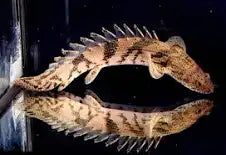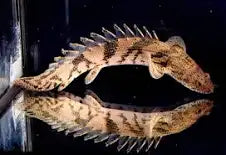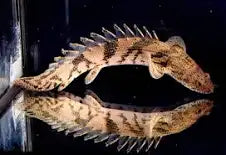Polypterus-Endlicheri 18-25cm
Polypterus-Endlicheri 18-25cm
check_circle Fast Shipping
check_circle Quality Products
check_circle Affordable Price
Reach out to us on ''available to order'' items via WhatsApp or email
Low stock: 1 left
Couldn't load pickup availability

Polypterus-Endlicheri 18-25cm
package_2
Product Description
Product Description
All our fish, shrimp and corals are bagged with fresh oxygen as well as a heat pack in winter.
When ordering livestock please select the box size and add it to your cart for accurate overnight (1-2 days) shipping costs. A small box can take 1-2 bags and a medium box 6 bags. One bag fits max 10 small (1-3cm) fish or max 2 medium (3-5cm) fish or max 1 large (>5cm) fish.
ONE SPECIES PER BAG. Eg: One bag of 10 neon tetra
Polypterus endlicheri (Endlicher’s Bichir)
Description:
-
Appearance:
- Size: Typically reaches up to 18-24 inches (45-60 cm) in length, though some individuals can grow larger.
- Color: The body is generally dark brown or olive-green with lighter-colored bands or spots that can vary. The pattern may change as the fish matures.
- Body Shape: Elongated, cylindrical body covered with heavy, bony scales. Features a series of dorsal finlets that are a defining characteristic of bichirs.
-
Behavior:
- Activity Level: Mostly slow-moving but active, particularly during feeding times. Primarily nocturnal and more active at night.
- Social Behavior: Can be somewhat territorial and may display aggression towards other bichirs or similar species. Generally prefers to be kept solitary or with other large, non-aggressive fish.
Care Requirements:
-
Tank Size:
- Minimum: 100 gallons (379 liters) for smaller specimens. Larger individuals or multiple bichirs may require a tank of 150 gallons (568 liters) or more.
-
Tank Setup:
- Substrate: Soft sand or smooth gravel is preferred. Avoid sharp or rough substrates to prevent injury to the fish.
- Decorations: Provide hiding spots using driftwood, rocks, and caves. These structures offer security and mimic their natural habitat.
- Plants: Live or artificial plants can be added. Ensure they are well-secured and can tolerate the bichir's activity.
-
Water Parameters:
- Temperature: 75-82°F (24-28°C). Maintain a stable temperature within this range.
- pH: 6.0-8.0. The fish can adapt to a range of pH levels but prefers slightly acidic to neutral water.
- Hardness: Soft to moderately hard water is ideal.
- Filtration: Strong filtration is necessary to keep the water clean. Ensure effective mechanical and biological filtration without creating strong currents.
-
Diet:
- Primary Food: Carnivorous. Offer a varied diet of high-quality pellets, live or frozen foods such as worms, small fish, and crustaceans.
- Supplemental Food: Occasionally include treats like small shrimp or other protein-rich foods.
-
Behavioral Considerations:
- Compatibility: Suitable with other large, peaceful fish. Avoid small or fin-nipping tank mates.
- Tank Mates: Good companions include other large tetras, catfish, and non-aggressive larger species. Avoid aggressive or territorial fish.
-
Tank Maintenance:
- Water Changes: Perform regular water changes of 25-30% weekly to maintain water quality and reduce waste buildup.
- Cleaning: Keep the tank clean and ensure the filter is functioning properly. Remove uneaten food to prevent water quality issues.
-
Health Care:
- Observation: Regularly monitor for signs of illness or stress, such as changes in behavior, loss of appetite, or visible abnormalities.
- Treatment: Maintain high water quality to prevent diseases. Consult an aquarium specialist if health issues arise.
-
Additional Notes:
- Lifespan: Can live up to 10-15 years with proper care.
- Breeding: Breeding in captivity is rare. Optimal conditions may encourage spawning, but it typically requires specific environmental factors.


